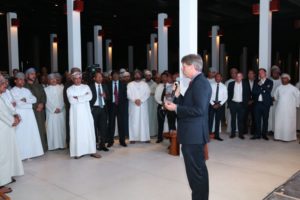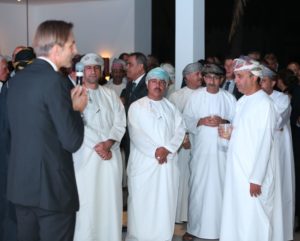SOHAR signs multiple agreements for upcoming projects
SOHAR Port and Freezone commenced its 15th anniversary recently with its signature annual business reception held at ‘The Chedi’ Muscat. During the event, SOHAR revealed its operating results for 2018, looked back over its 15 years of double digit growth and has entered into new partnership agreements signalling a strong start to 2019.

In 2018, SOHAR witnessed yet another year of consistent growth with an average of 1.2mn tonnes of cargo handled by the port every week in 2018, and has also set new records in both vessel calls and cargo throughput. Dry bulk and liquid bulk throughput increased by 14% as compared to 2017 and SOHAR received 3,443 vessel calls in 2018, marking a significant increase of more than 12%.
Signalling a positive start to 2019, SOHAR has entered into two partnership agreements, the first was with Mannesmann and the second with Oman Maritime Waste Treatment.
The collaboration with Mannesmann will see the creation of Calcined Petroleum Coke (CPC) and Recarburizer Calcined Coke (RPC) plants on 30 hectares (ha) of land at the Port. This is one the first projects that will be built in the reclaimed area of the Port, and will add value to both the aluminium and steel industries within SOHAR.
MARPOL compliant
The agreement with Oman Maritime Water Treatment, which is a joint venture between Khimji Ramdas in Oman, Ramky Enviro Engineers in India and Nature Group of the Netherlands, will see the construction of a full-fledged International Protocol of Marine Pollution (MARPOL) compliant facility at the Port. This is done to ensure that ship waste collection and disposal are carried out in compliance with MARPOL. As of January 2018, all countries that are signatories to MARPOL must adhere to its regulations.

SOHAR also signed an agreement to replace its existing tug boats. According to the agreement, five existing vessels that provide towage services for all the vessels entering and exiting the port will be replaced. The contract will have a duration period of 15 years, and delivery of the first tugboats is expected on 1 August 2020.
Over the past year, SOHAR did not only witness capacity growth, but the Port itself grew in size owing to the SOHAR Port South expansion. In 2018, 50ha of land was added to the current capacity of 2,000ha in the first phase of the expansion and a further 200ha will be added in subsequent phases.
Port South development
“Earlier this year, we signed an agreement with Dredging International NV for the development of the first phase of SOHAR Port South,” Mark Geilenkirchen, CEO, SOHAR, noted. “This expansion is vital for SOHAR and has been steered by our rapid growth; it will be assigned almost exclusively for oil and gas-based investments,” he continued.
Geilenkirchen also highlighted the SOHAR partnership with Marafi Sohar for the creation and the operation of new high-capacity mineral aggregate terminal at the Port. The new development is expected to generate more market opportunities since the port is ideally equipped to develop high-capacity aggregate facilities, given that most of the quarries producing mineral aggregate are in close proximity to the port.
Apart from fuel products, the refinery in also produces significant volumes of naphtha and propylene, which serve as feedstock for an adjoining aromatics and polypropylene plant. The deep-water berths allow for raw materials such as iron ore to be easily received, ensuring smooth primary and secondary production processes.
Food focus
Given the massive potential of the food industry, both in upstream and downstream businesses, the Food Cluster has been revamped. The aim of this cluster is to promote the entire value chain of food processing and logistics support within the expanding multi-billion dollar regional food industry.
In addition to the new flour mill and grain silo complex, the SOHAR food cluster will also house a sugar refinery, with packaging and distribution facilities planned in the future. “The cluster will enable us to attract significant business in the coming years and is complemented by a dedicated deep-water berth and agro-terminal for the fast and efficient movement of foodstuffs within the Port,” Geilenkirchen added.
Commenting on the growth in the Freezone, Jamal Aziz states, “The increase in businesses plays a significant role in Port development. The Freezone hosts a multitude of companies not only from Oman, but also from the GCC, the Indian sub-continent, Asia and Europe. Many of these companies operate in the industrial and logistics sectors, and have established a competitive advantage in SOHAR by offering lower operating costs, energy-saving systems, and providing quick and easy land lease options, which include pre-built warehouses and commercial offices,” remarked Engr. Jamal Aziz, CEO SOHAR Freezone & Deputy CEO, SOHAR Port.
“Additionally, we are also promoting the consolidation of shipping cargo for smaller players in the Freezone. Providing more practical options for cargo consolidation reduces unnecessary delays and helps increase cargo volumes. Our much larger upcoming projects include new ferro-chrome smelters that are under construction in the Freezone. This will be accompanied by the second biggest antimony plant of its kind in the world, and the creation of the SOHAR Cotton Cluster. SOHAR has also recently concluded an agreement for the creation of a petroleum coke calciner plant in the Freezone, where raw petroleum coke will be used as feed stock for downstream petrochemical industries,” Engr. Jamal Aziz concluded.

